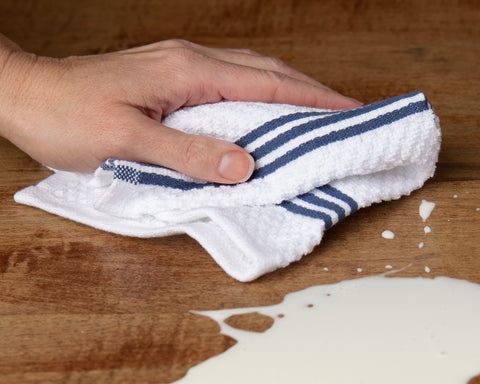Do you ever wonder to yourself “Why do my dishcloths smell bad?” Damp towels are vulnerable to bacteria growth. Bacteria that feeds on grease, food particles and moisture can start to cause a musty smell. The problem becomes worse when a dishcloth is not given an adequate amount of time to dry. We have all the tips and tricks for you to avoid having those stinky bacteria-filled towels in your home!
How to clean your smelly dishcloths.
Hot boiling water kills the bacteria that a normal wash cycle won’t do to leave your dishcloths smelling fresh. Washing your dishcloths every 30 days in boiling water will keep them from getting that stale smell. In between the boiling water deep clean, you can wash them in your normal wash cycle on warm. Here is how to clean your smell dishcloths in boiling water:
- Fill a large pot with water and bring to a boil.
- Boil your dishcloths for 15 minutes.
- Let the water cool before handling as the towels will be very hot.
- Dry as normal.
- Enjoy the freshness!
How often should you change out your dishcloths?
The USDA recommends washing your dishcloths regularly, but what does that mean? We tell our customers if you are using your dishcloths to wipe down tables, clean up messes and wash dishes, you’ll want to switch these towels out daily. Swapping your dishcloth out frequently will keep them from developing bacteria that spreads to other areas of the home as you are using them.
We recommend having a bucket of clean cloths and dirty cloths. You should have at least one set of 8 dishcloths to get you through the week – one for every day and a spare just in case! Dump all the towels from the dirty bucket in the washer (or in boiling water if it has been 30 days) at the end of the week. Using a dishcloth daily is also sustainable way to ditch your paper towels. Check out our blog on how to make the switch!
Don’t leave your dishcloths soaking wet after use.
Wringing out your dishcloths after using them can help lengthen the time you can use them before they begin to smell musty. Twist and squeeze all the water you can get out of them and then lay completely flat to dry on the counter. You can also hang them over your faucet or sink divider. Never leave them crumpled up in a ball because they won’t dry as quickly and moisture breeds bacteria.





